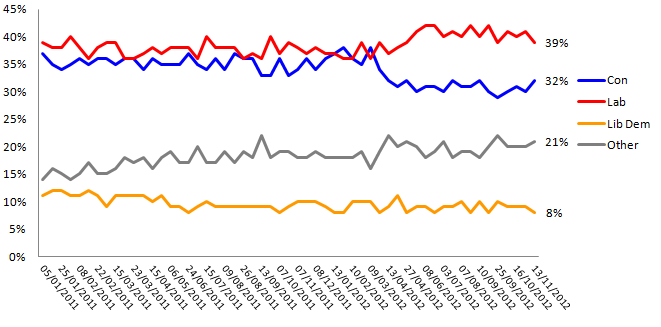Political Polling – 13th November
13th November 2012
Labour’s lead has dropped to seven points, down from 11, with the party on 39% to 32% for the Conservatives.
UKIP are again ahead of the Lib Dems with 10% to 8% for the junior coalition partner. This will be the fourth poll in a row where this has been the case and the sixth poll since the Lib Dems were last ahead of UKIP (the two were tied in the survey running from the 25th to 28th September).
- All three party leaders have seen improvements in their net approval ratings but the most dramatic is for Prime Minister David Cameron who moves from 32% approving to 36%. His net rating moves from -19% to -12% suggesting that his handling of the BBC crisis and the now infamous Phillip Schofield interview may have gone down well with the public
- Ed Miliband?s net approval rating has improved slightly to -10%, matching the high score he received after his conference speech. The number who approve remains the same as the last two surveys (27%) but the number who disapprove has declined slightly to 37%
- Nick Clegg?s approval rating improves slightly to 15% while the number disapproving drops below 60% for the first time since August. 58% disapprove of the Lib Dem leader giving him a net approval rating of -43%
This week we asked respondents two questions about Britain?s relationship with the European Union, the first whether the UK?s membership was generally a good thing or a bad thing and the second whether they would vote to remain a member or withdraw in a hypothetical in/out referendum.
- 28% of likely voters think that the UK?s membership of the EU is a good thing while 45% think it is a bad thing. 18% think it is neither a good nor bad thing
- Labour voters are evenly split with 37% calling it a good thing, 32% a bad thing and 20% taking a neutral position
- In contrast, Conservative voters split two to one with 53% calling it a bad thing and just 26% a good thing
- Unsurprisingly Lib Dem voters are more in favour with 45% calling it a good thing and 28% a bad thing while 92% of UKIP voters called it a bad thing
- 18-34 year olds are the only demographic group clearly in favour with 44% calling EU membership a good thing and 25% a bad thing. 35-54 year olds are the mirror opposite (45% bad thing, 26% good thing) and over 55?s are much more clearly opposed with 59% calling it a bad thing and 20% a good thing
- Interestingly, The only region to have a clear split in favour of EU membership was cosmopolitan London with 45% calling it a good thing and 30% a bad thing
When asked how they would vote in a hypothetical in/out referendum, 56% would vote to leave while 29% would vote to remain. 14% said ?don?t know?.
- 68% of Conservative voters would vote to leave the EU while 24% would vote to remain
- Despite a plurality seeing EU membership as a good thing, Labour voters would narrowly vote to leave with 44% opting to withdraw and 39% opting to remain
- 47% of Lib Dem voters would vote to remain but surprisingly for the pro-EU party, 39% would vote to withdraw
- 97% of UKIP voters would vote to withdraw, hardly surprising given that this is the party?s single overriding cause
Topline Voting Intention
| † | % | Change |
| Conservative | 32 | +2 |
| Labour | 39 | -2 |
| Liberal Democrats | 8 | -1 |
| Other parties | 21 | +1 |
Other Parties (breakdown)
| † | % | Change |
| UKIP | 10 | n/c |
| Green | 3 | n/c |
| SNP | 3 | -1 |
| BNP | 2 | +1 |
| Plaid Cymru | 1 | +1 |
| Other | 1 | n/c |
Approval ratings
| † | % Approve | % Disapprove | Net rating | Net rating (own party) |
| David Cameron | 36% | 48% | -12% | +78% |
| Ed Miliband | 27% | 37% | -10% | +47% |
| Nick Clegg | 15% | 58% | -43% | +37% |

Opinium Research carried out an online survey of 1,957 GB adults aged 18+ from 13th to 15th November 2012. Results have been weighted to nationally representative criteria.
Interview Method and Sample
This survey is conducted online by CAWI (computer aided web interviewing), using Opinium?s online research panel of circa 30,000 individuals. This research is run from a representative sample of GB adults (aged 18+ in England, Scotland and Wales). The sample is scientifically defined from pre-collected registration data containing gender, age (18-34, 35-54, and 55+), region (North East, North West, Yorkshire and Humberside, East Midlands, West Midlands, East of England, London, South East, South West, Wales, and Scotland), working status and social grade to match the latest published ONS figures.
Opinium also takes into account differential response rates from the different demographic groups, to ensure the sample is representative.


